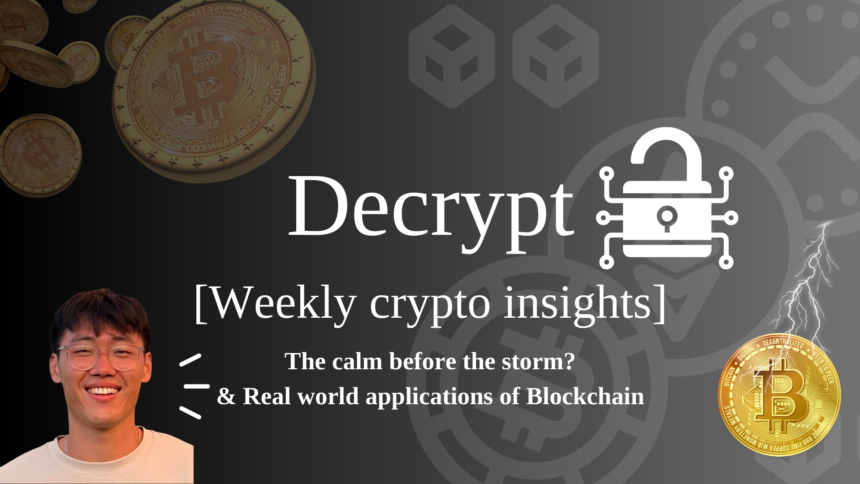Zayden is currently at start-up incubator, WhatNot Studios in Bangkok, Thailand. Originally from Singapore, his inquisitive nature brought him overseas to gain experience and learn new things.
It is that same nature that got him into DeFi and Web3, often spending hours a day reading up on it. Self-proclaimed Web3 enthusiast, and investor in cryptocurrency.
Guest Author: Zayden Qu
So what has been happening around Crypto this week?
The past week has been relatively quiet for the Crypto industry, it feels like the calm before the storm. So what are the potential storms? There are several things brewing behind the scenes, let’s keep track of them together and see how they might affect the Crypto market.
El Salvador’s Election Results:

Under Nayib Bukele, El Salvador became the first country to use Bitcoin as legal tender. And now, the enigmatic president has just won the election by a landslide, with more than 85% of the votes. He became the first president in El Salvador to run for a second term since 1983.
My Take: Generally seen as bullish among the Crypto community, El Salvador is becoming the first real world application of DeFi at a large scale. I believe this news is just something to note, I don’t expect it to affect the price of Bitcoin much.
Hong Kong/China’s Spot Bitcoin ETF:
The Hong Kong Securities and Futures Commission (SFC), akin to the SEC in the US, has already received applications for a Bitcoin Spot ETF from Harvest Hong Kong (the largest fund manager in China) and Venture Smart Financial Holdings, with Samsung Assess Management also expected to join.

Interestingly, the SFC is much more crypto-friendly and progressive compared to the SEC, they have developed crypto-centric regulations in 2023. They are expediting the approval process to target Q1 of 2024 as the beginning of trading, likely after Chinese New Year.
My Take: A good piece of news for the Crypto market, we can expect more demand and inflow of money into Bitcoin when they start trading, driving up the price of Bitcoin. However, we must view the Bitcoin Spot ETFs as “laying pipeline” for the demand for Bitcoin, instead of it being the demand itself. We might only see a strong price action when the demand surges.
Some favourable and exciting statistics:

My Take: These statistics essentially demonstrate an increase in popularity of Bitcoin and Cryptocurrency in January. Since supply of Bitcoin is limited, an increase in popularity translates to an increase in demand, which is generally a good thing. But we have to see if these statistics hold up or improve in the future.
Also, FTX expects to fully repay customers that were affected by their bankruptcy.
Bad news – Genesis:

The bankrupt Crypto lender, Genesis filed a motion asking the U.S. Court for an approval to sell their assets in Grayscale Bitcoin Trust (GBTC) worth $1.4 billion.
My Take: If approved, we will likely see further sell pressure and a drop in Bitcoin price, similar to the FTX sale of their GBTC shares. However, we have already seen that the other US ETFs are capable of soaking up the GBTC outflows. With the addition of the Hong Kong ETFs and the Bitcoin Halving narrative, the Bitcoin prices will likely continue to be competitive. I do however, expect volatility if approved.
Real World Applications of Blockchain Technology
Understanding real world applications of Crypto and Blockchain Technology is important. Because these applications bring about tangible benefits to society and people, helping the masses understand the value of Blockchain technology. This will eventually propel the narrative of the importance of Blockchain, thus driving retail adoption and demand in Cryptocurrency.

(Image from NTU Blockchain Club)
Supply chain

- Blockchain technology in the supply chain addresses the critical need for transparency and traceability for all stakeholders involved in the supply chain. Every step in the process, from procurement of raw material to the consumer is documented and available to view on the blockchain, reducing fraudulent activities and assures product authenticity.
My Take: This is also an emerging field with the popularity of Decentralized Physical Infrastructure Networks (DePIN). It allows for one of the easiest ways to view tangible benefits of blockchain technology.
Healthcare

- Blockchain ensures the security of patient data and medical records. Patients will have sole control over their data, only allowing access to healthcare providers that they authorize. The patient data can also be seamlessly exchanged across disparate authorized healthcare systems, improving interoperability.
Intellectual Property (IP) and Copyright

- Blockchain technology allows creators to have full ownership over their IP. This is because blockchain is immutable and once IP is registered on the blockchain, it is tamper-proof. Creators can also monitor the utilization of their IP, combatting copyright infringement.
Voting Systems

- Blockchain technology is able to record every vote as a transaction, which are encrypted and time-stamped. It is virtually impossible to manipulate or tamper with the results, removing any chance of electoral fraud and boosting publicconfidencein the voting process.
Real Estate

- Blockchain technology ensures that an individual’s property records are immutable, eliminating any fraudulent property transactions. It will also remove the need of intermediaries, such as title companies, simplifying property ownership and reducing associate cost.
Cross-Border Payments

- Traditional international money transfer typically takes a few days and incur expensive intermediary costs. With blockchain technology being decentralized and borderless in nature, cross-border transactions are naturally fast andcost–efficient.
My Take: Probably the most established application of blockchain technology, with most use cases being in Decentralized Finance (DeFi) and Decentralized Exchanges (DEX).
Identity Verification

- Blockchain technology allows individuals to have full control over their identity data and personal information instead of storing it with companies such as Google or Meta. Users can grant or revoke access to their personal information as required, mitigating the issue of unauthorized data collection and identity theft.
My Take: Data privacy is a core principle of blockchain technology, there are already many projects delving into decentralized social media that allows users to have full control over their own information, e.g., Farcaster.









